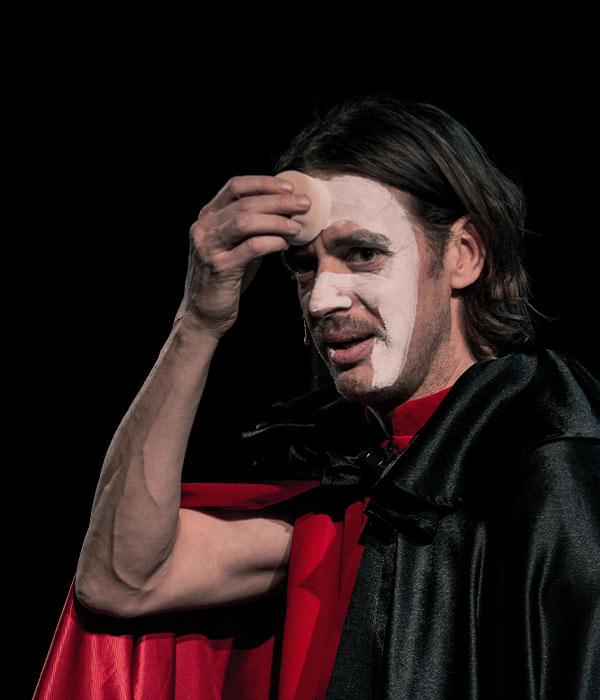

Helsinki Festival brings to the Finnish National Theatre's main stage a breathtaking and visually stunning interpretation of Klaus Mann's novel Mephisto, performed by the Estonian Drama Theatre. Mann's text, still relevant today, delves deeply into the complex intersections of power, morality, politics, and art. Director Kertu Moppel received the Estonian State Cultural Award for directing Mefisto in 2022 and was nominated for the Estonian Theatre Union's award for Best Director. Juhan Ulfsak, who plays the lead role in Mefisto, also received the Estonian State Cultural Award and was nominated for the Best Actor award by the Estonian Theatre Union.
The setting is Germany in the 1930s. Hendrik Höfgen is a brilliant actor, a blend of great artistry and impressive showmanship. When the Nazis rise to power, Höfgen faces a difficult choice: should he continue his rising career, even if it means cooperating with political forces he opposes, or remain true to his principles and say goodbye to his career?
The play is based on Klaus Mann’s novel Mephisto (1936). The German Klaus Mann (1906–1949), the eldest son of author Thomas Mann, began his writing career at the age of 19 and went on to write plays, novels, and essays. Mann was part of the bohemian leftist circles and was involved in political cabaret in the 1930s. He fled from Germany first to the Netherlands and later to the United States, returning to Germany in 1945 while serving in the U.S. Army.
In real life, the character of Hendrik Höfgen was inspired by the famous German theater director Gustaf Gründgens (1899–1963), remembered as a charismatic actor. Gründgens’ legendary roles included Mephistopheles and Hamlet, which he performed hundreds of times, achieving a total of 250 roles in his career. As a young man, Gründgens was a close friend of Klaus Mann (and briefly married to Mann’s sister, Erika). However, personal and ideological differences eventually separated the friends. During the Nazi regime, Gründgens had a successful career and led a luxurious life, frequently attending Nazi celebrations. He was in a relationship with a man but avoided persecution due to the protection of Göring. In 1933, Gründgens was appointed director of the Prussian State Theatre, while Klaus Mann had to flee Germany to save his life.
Mefisto has been performed at the Estonian Drama Theatre over 70 times. At Helsinki Festival, the play will be staged on the National Theatre’s main stage. Alongside the outstanding cast of the Drama Theatre, the performance will feature the boys' choir Juhanid from the Estonian National Opera, Estonia.
Additional information:
The performance lasts 2 hours and 15 minutes, with no intermission. Substitute cigarettes and bright lights will be used briefly on stage.
Language: Estonian
Subtitles: Finnish
The visit is supported by the Estonian Embassy in Helsinki.
Production Team
On stage: Sandra Ashilevi, Lauri Kaldoja, Guido Kangur, Markus Luik, Hilje Murel, Karmo Nigula, Merle Palmiste, Teele Pärn, Gert Raudsepp, Inga Salurand, Indrek Sammul, Britta Soll, Hendrik Toompere Jr, and Juhan Ulfsak, as well as the Juhanid boys' choir from the Estonian National Opera, Estonia, Choir Conductors: Jaanika Kuusik and Maret Poll.
Director and Adaptation: Kertu Moppel
Based on the novel by Klaus Mann
Translation of the novel from German to Estonian: Rita Tasa
Set Design: Arthur Arula
Choreography: Jüri Nael
Lighting Design: Priidu Adlas
Sound Design: Lauri Kaldoja
Video Design: Epp Kubu
Finnish Translation and Subtitles: Varja Arola
Organizer: Johannes Tammsalu
Recordings Used in Sound Design: Joel Remmel, Heikko Remmel, and Ahto Abner